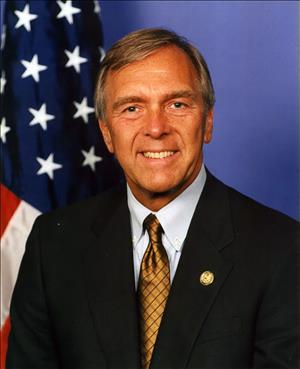On November 5, 2002, Washington voters soundly reject the state Legislature's Referendum 51 transportation plan and gas-tax increase while narrowly approving Tim Eyman's Initiative 776, which caps state and local motor vehicle excise taxes at $30 per year. All nine of the state's members of the U.S. House of Representatives are re-elected. Seattle voters narrowly approve a new Seattle Popular Monorail Authority (which they will overwhelmingly shut down three years later amid concerns over its financing and leadership).
Referendum 51, which would have raised $7.9 billion for road and transit improvements through a 9 cent gas tax increase and other fees, was defeated by a margin of 61.6 percent opposed to 38.4 percent in favor. The plan drew criticism from environmental and transit advocates as well as from traditional anti-tax conservatives.
At the same time, voters approved Initiative 776, sponsored by populist tax-cutter Tim Eyman, by 51.5 percent to 48.5 percent. I-776 was a follow-up to Eyman's 1999 Initiative 695, which sought to cap state motor vehicle excise taxes (MVET -- commonly referred to as "car tabs" in reference to the license plate tabs evidencing payment) at $30 per year. I-695 was thrown out by the courts, but the Legislature enacted the $30 state MVET cap anyway. I-776 extended the $30 limit to local MVET levies, and also sought to repeal previous MVET levies that represented approximately 20 percent of the budget for Sound Transit, the agency responsible for building and operating high-capacity public transit systems in heavily populated areas of King, Pierce, and Snohomish counties. The state Supreme Court subsequently upheld I-776, but ruled that the measure could not constitutionally apply to the previously-enacted Sound Transit MVET, which remained in effect.
Nethercutt versus Haggin
All nine members of the U.S. House of Representatives from Washington ran for re-election, and all won easily. In the Fifth District, covering the eastern third of Washington with its population center in and around Spokane, Republican George Nethercutt (b. 1944) won his fifth term in Congress by beating Democrat Bart Haggin (b. 1936), who ran on an environmental and peace platform, and Libertarian Rob Chase. Haggin criticized Nerthercutt for his reversal on term limits. Nethercutt had originally run on a term-limit platform, promising to serve only three terms if elected, but in 2000 he ran for and easily won a fourth term.
In his 2002 campaign, Haggin pushed for campaign-finance reform, refusing to take corporate donations. Active in the environmental movement in Eastern Washington as a member of the Lands Council and Audubon Society, Haggin criticized Nethercutt for what he saw as the congressman's foot-dragging when it came to designating Idaho's Silver Valley a Superfund site. The two also sparred over a very incendiary issue at the time: whether the United States should invade Iraq. Congress authorized an invasion in October 2002. It would be launched on March 19, 2003, based on the supposed intelligence (later proved false) that Iraq was stockpiling "weapons of mass destruction."
"I can assure you it's real, this threat from Saddam Hussein," Nethercutt said during a debate in 2002. "If we don't face it now, we'll face it in two or five years" (Spokesman-Review, November 1, 2002). Nethercutt won a landslide victory with 62.7 percent of the vote to Haggin's 32.2 percent and Chase's 5.1 percent.
Nethercutt's two Republican Congressional colleagues -- Doc Hastings (b. 1941) in the Fourth District and Jennifer Dunn (1941-2007) in the Eighth -- also handily defeated their challengers, as did Democrats Jay Inslee (b. 1951) in the First District, Rick Larsen (b. 1965) in the Second, Brian Baird (b. 1956) in the Third, Norm Dicks (b. 1940) in the Sixth, Jim McDermott (b. 1936) in the Seventh, and Adam Smith (b. 1965) in the Ninth.
Trying to Rise Above It All
The Seattle Popular Monorail Authority (SPMA) was proposed by Citizen Initiative 1, which also called for a 1.4 percent MVET tax to raise funds to construct and operate a proposed "Green Line" monorail route extending 14 miles from Crown Hill through downtown to West Seattle. The proposal was a descendent of Initiative 41, approved in 1997, and Initiative 53, approved in 2000. The 1997 vote established a new public development authority, the Elevated Transportation Company (ETC), to plan an expanded monorail system for Seattle. When ETC met resistance on the Seattle City Council and from other transit agencies, supporters organized "Rise Above it All" and sponsored Initiative 53 to fund planning for a system for resubmittal to voters.
Following passage of Initiative 53, the ETC reorganized under the chairmanship of former Seattle City Council member Tom Weeks and hired Joel Horn, a former developer and leader of the 1996 Seattle Commons effort, to coordinate planning and community outreach. ETC approved the proposed Green Line route on August 5, 2002. Initiative 1 sought $1.75 billion in funding for the Green Line and created a new Seattle Popular Monorail Authority, with a nine-member board, to supersede the ETC.
The initiative met with spirited opposition from Citizens Against the Monorail, led by former Seattle Port Commissioner Henry Aronson. The SPMA plan was also criticized by King County officials including County Executive Ron Sims (b. 1948) and Council Member Dwight Pelz, who feared that the Monorail would interfere with completion of the Sound Transit system and compete for future funding. Such concerns split the city down the middle, with the Seattle Post-Intelligencer and The Stranger endorsing SPMA, and The Seattle Times and Seattle Weekly opposing it. The monorail plan won by just 877 votes out of 189,000 cast, but the victory was temporary. In 2005, following cost overruns and revenue shortfalls that raised questions about the project's leadership, Seattle voters killed the monorail project.

